- Home
- Alice McDermott
Someone Page 6
Someone Read online
Page 6
I left the chair in the kitchen, rehearsing as I did the innocent look I would give my mother when she returned—convinced, of course, that the bread had burned—and discovered instead that I was sitting serenely at the table with the newspaper spread before me and the perfect loaf cooling on the windowsill.
I walked through the living room, but last night’s paper wasn’t there. I walked into my parents’ bedroom: the trick would be to convey by my own astonished look my utter disbelief that my mother had ever doubted me. My mother’s housedress and apron were thrown haphazardly across the bed. Where downtown? I wondered.
I went into my own room—my room alone now that Gabe was in the seminary. Now that Gabe was in the seminary, he slept on the couch in the living room when he came home and hung his dark clothes in the hall closet like a visitor. From my window I could see Gerty Hanson and another girl strolling arm in arm toward the part of the street where the boys were playing. I tilted my head to watch them climb the stoop four doors down, where a small knot of the usual girls were already sitting on the steps.
It would only take a minute, I knew, to run down and tell them all that my mother had me inside baking bread. That I would be with them in forty minutes’ time, at most. But when I arrived at the stoop, the girls were all bent over their knees, laughing extravagantly into their laps and their hands. Gerty had just told a story, which she repeated for me, a story her father had told about a very drunk man who was throwing tomatoes at the door of a church, during a funeral no less. “What the devil’s gotten into you, man?” her father said. And the man, wound up like a pitcher on the mound, said to her father, “To hell with the devil,” and threw the tomato anyway.
Unless you count the absurdity of good little Gerty saying “hell” in a longshoreman’s gravelly voice, I was aware even then that the story wasn’t funny enough to merit the other girls’ mad laughter. That the laughter itself was meant mostly to get the boys in the street to glance over from their game. To get the boys to cry out, “Ah, shut up,” as they were doing now that Gerty’s second telling had the girls roaring once more. “Bunch of cackling hens,” the boys said to one another in their own fathers’ voices, even as the girls shook their heads, as their mothers would do, and pretended they hadn’t heard.
When the laughter had subsided and the boys turned back to their game, I announced that my mother had me trapped. “Time I learned something about cooking,” I repeated, which led Gerty to tell another funny story about how her aunty had recently tried to hide a pot of burned parsnips in the dumbwaiter. It was well known to us all by then that Gerty’s aunty hadn’t even known how to peel a potato when she first arrived from the other side to run the household.
“She still can’t poach an egg,” Gerty said with some haughtiness. “I’ve tried to show her a hundred times, but she just can’t learn.” She held up a finger, instructing all of us. “A touch of vinegar in the water does the trick.”
“Well, I don’t want to learn,” I said. “Once you learn to do it, you’ll be expected to do it,” and was amazed at the way my own words clarified for me what had been, until then, only a vague impulse to refuse. They looked at me over their knees, this gaggle of girls: a lifetime of hours in the kitchen bearing down on us all. “I’d rather be like your aunty.”
Gerty shook her head. “My dad says she’d burn water if she could.” And the girls laughed again, stamping their feet and slapping their knees. And the boys playing ball in the street looked over their shoulders to shout, “Be quiet, can’t you?” There would be no veering from that future.
I returned home with fifteen minutes on the clock still to spare. I opened the oven door and used the towel to take out the heavy bread. It was, I knew, paler than it should have been, but I turned off the oven anyway, simply to dispatch the task. I joined the girls again just as they were gathering themselves to leave the stoop and walk slowly down the street, pretending we only wanted to get a soda.
When I came home again, my father was at the dining-room table and my mother was bringing him his tea. My mother crooked her finger and led me into the kitchen, where the loaf, sitting on the cutting board, was darker than it had been. “What time did you take this out?” she asked, one eyebrow raised.
“When you told me to,” I said vaguely.
“It was hardly cooked,” she said.
I shrugged, indicating both that I could not be blamed and that it was all of no matter to me.
My mother sliced the rebaked bread and carried it in to my father where he sat at the cloth-covered table. I followed with the butter. Gabe’s place at the table was empty now. Now, after dinner, we listened to the radio.
The tea was poured. My father spread the butter on the thick slice of bread and winked at me before he took a bite. And then chewed, and then moved his mouth as if his tongue had been burned. He swallowed and took a drink of tea. My mother said, “Too much baking soda,” and placed her barely bitten piece of bread on her plate. And then put her hands in her lap, her back straight. “You must have added it twice,” she said, sternly enough to show that she understood this was sabotage. “I don’t know how I didn’t see it.”
I had added it, in fact, four times, with my back to my mother and my mother’s impatience—Glory be to God, read the recipe, Marie, how will you ever learn—making her, on three separate occasions, turn away.
“You’ll have to learn to pay more attention, Marie,” my mother was saying. “You’ll never learn to cook if you don’t pay attention. A kitchen can be a dangerous place if you don’t pay attention.”
“Oh, she’ll learn,” my father was saying, amused. “She’ll learn in good time.”
I bowed my head and studied my hands. I would not, I knew. I would not learn. Gerty Hanson had learned, but I would not.
I raised my eyes slowly, touching my glasses back onto my nose, well pleased with myself, but careful not to give this away. The day had grown cloudy and the dining room was dim. My father had returned the piece of bread to his plate, but as if to convey his sympathy, he still held the edge of it gently between his thumb and index finger—perhaps not wanting to hurt my feelings any further by letting go of it completely. His other three fingers, held delicately aloft, were trembling. His broad hand against the white cloth and the china plate was a color I had not expected: the gray fingernails sunk too deeply into the swollen yellow flesh. His flesh was swollen, thin as he was. I looked at his smiling face. Although we were only a few feet apart, across the familiar cloth at the familiar table, I felt my eyes strain, as they sometimes did when close things seemed suddenly to contract into a great distance. In my recollection, there was something of the smell of ether in the air.
That night, I found my mother sitting on my bed when I came out of the bathroom in my slippers and my robe. She asked me, “How are you?”
Surprised by her presence, I replied, “Fine, thank you, and yourself?” which was how she always answered when asked the same question by people on the street. Now she looked a little surprised. She said she was fine, thank you, as if by instinct alone. Her hands were in her lap. Her back was straight.
“Although,” she said, conversationally, as if we were indeed neighborhood ladies meeting on the street, “I’m a bit worried about your father.” She told me then that he was going to stop by the hospital tomorrow, to see if they couldn’t fix him up.
I said, with street decorum, “I’m sorry to hear that.”
I felt no threat from this news, blithe child that I was, because my thoughts were all on the strange sight of my mother sitting, idly, it seemed to me, on the edge of my bed. She came into my room often enough in those days, but always at a bustle, there to dust the furniture or mop the floor, to place clean clothes in my dresser or to turn the mattress or to scrub the bed frame with ammonia to ward off bedbugs. She came in to pull the blankets up over my shoulders every night, to kiss my forehead and remind me to say my prayers. Her stillness now, sitting here, her hands empty, made her presence p
articularly peculiar.
She asked me if I would like to come along with them to the hospital. I couldn’t go upstairs to see my father settle in, you had to be over sixteen to enter the wards, but I could go as far as the lobby.
I said that would be fine.
My mother said, looking into her hands. “In sickness and in health.” Then she raised her eyes to me, cautiously, it seemed. “That’s something you must repeat when you are married. When you make your marriage vows.”
I said, “I know.”
She raised her chin and even smiled a little, with the kind of subtle admiration she usually turned on Gabe. “Do you now?” she asked me. A kind of mirth entered her eyes. “What else do you know?”
I recited the entire phrase: “For better, for worse, for richer, for poorer, in sickness and in health, till death do us part.” Until I saw my mother impressed by my knowledge, it never had occurred to me to wonder how I knew the words, from school, from the movies, from my friends. When she asked me, I said, “From my friends.”
My mother bent her head again and said, “Your friends talk to you about marriage, then. About what goes on.” I believe she was blushing.
I turned away from her to pick up my brush from the dresser. I began to brush my hair, still damp from my bath. I could see her reflection in my dressing mirror, sitting straight-backed on the edge of my bed, her hands in her lap. “Oh sure,” I said casually.
“Then you know,” my mother said, “about what goes on.” And in the mirror I saw I still carried the flush from the hot water in the tub. “Oh sure,” I said, not certain even then what I was admitting to.
From behind me, I heard her sigh. “You’re growing up.” She said it much as she had said it that afternoon, both amused and melancholy, and not a little impatient. I heard the familiar squeak of the bedsprings as she stood. “It’s good that you know these things.” Her voice, like the sound of the springs, seemed to move upward into the room, as if relieved of some weight. “We’ll go downtown after Mass tomorrow,” she said. “Get to bed now.”
In the morning, after church, the three of us took the trolley to the hospital. My father carried a small black satchel. In the lobby, he put his hand to the top of my head and said, “Be a good girl now”—rolling his tongue the way he did, tasting the sweetness of the joke. He leaned down, and I kissed his cheek, which was smooth-shaven and smelled cleanly of bay rum. And then I nearly knocked his hat off his head as I threw my arms around his neck. He patted my back, and then placed his two hands on my shoulders as he used to do outside the speakeasy, as if to keep me there, unmoving, while he went upstairs with my mother to get settled in.
When she came down again, the two of us walked outside and crossed the street, and then looked up at the big building. She pointed. It took me some time to find the right window. And then I saw him waving to us from behind the sky’s reflection.
In the sunshine on the sidewalk in front of Mary Star of the Sea, a Sunday morning in early June when I was seventeen, Walter Hartnett said, “What’s wrong with your eye?”
Our mothers were talking, purses over their arms and hats on their heads. The sun bright off the black glass of windshields, the tin fenders, the pocketbooks of the women in that after-Mass crowd, off the white sidewalk and the road and even the fading church bells. Bright off him, too, when I looked up at him: the dark hair and that pale face, and then the gray eyes turned translucent in the sunshine.
“Nothing wrong with it,” I said. “This one just screws up on me sometimes. When the sun’s strong.”
“Well, don’t let it,” he said. “It makes your whole face look funny.”
Back home, before the tiny mirror above the narrow bathroom sink, I saw it: the way the right eye, screwed closed, pulled at the corner of my mouth so that I looked like a tough with a wad of chewing gum in my cheek. How my glasses, thick bottle bottoms, stayed steady on my nose despite the contortions of the face behind them.
I was reminded for a moment of Walter Hartnett as a boy, the way he had held his hands behind his back, placid and wise beside blind Bill Corrigan. I was reminded of the sagacity with which Walter would nod whenever Bill Corrigan made his impossible calls. As if only he and the blind man could see what the rest of them could not.
I opened up the offending eye. Smiled at the mirror and said, “How’s that?” Took my glasses off entirely and smoothed the skin under my eyes and said, “Is that better?” Walter Hartnett. Mister Hartnett. Brushed my hair back—dark and thick but, like the scrinching eye, with a mind of its own—and peered into the small mirror, which showed me now only a smear of face and hair and smiling teeth, made my eyes as large as I could make them, and said out loud, “Is that better, Mr. Walter Hartnett?”
When he called that afternoon—his voice a small and miraculous thing inside the big black receiver—he apologized if he had been rude. It was none of his business, he said, what I did with my eyes. Later, in reconstructing the conversation in what was to be the first night of my life when sleep escaped me entirely, I replied, “Not at all,” but in truth, I’d barely murmured a word. “I’m bossy sometimes,” he said. “I get it from where I work. They give me a lot of responsibilities. Do you want to go out for a soda?”
When my daughters began dating, I told them, “Here’s a good rule: If he looks over your head while you’re talking, get rid of him. Walter Hartnett …” But by then they would throw up their hands. “Jesus, Mom, no more Walter Hartnett stories.”
Walter Hartnett on the candy-store stool looked over my head every time a figure appeared in the cornered doorway behind me. It got so I felt I could see them, too, the other people coming in out of the evening sun, as if I could feel their cool shadows upon my back as they stood for a moment in silhouette and Walter looked beyond me to see who it was. “Hiya,” he would say if he knew them—I might have been in mid-sentence—“How are you?” He’d shoot a finger up beside his face to signal a hello. Or just stare—this was for entering strangers—his eyes following whoever it was into the candy store, wondering, calculating, assessing as a man alone might do—a man alone and unguarded in the brazenness of his gaze. And then his gray eyes would drop to my face once more. There would be a second of utter indifference, boredom perhaps, and then a slow dawning—Oh yeah, you—a slow warming as his attention returned to me once again—Well, I’m happy to be here with you—sometimes even as much as a smile entering those dark-lashed eyes, and then they would flick up again, over my head, to greet with a raised chin, or only to observe, whoever it was whose shadow had fallen over my back. Then his eyes would return to my face, unseeing once more, and then the slow recognition would begin again.
It could only have been second nature to him, this veering attention. He couldn’t have calculated its effect. But it was, for me, by turns, devastating and thrilling, so that by the time our sodas were finished and we slipped from our stools, I was unsteady on my feet from the dizzying turns my hopes, my heart, had been taking. My pumps caught themselves, somehow, against his built-up shoe, and in the tangle as I fell into him, he slipped his warm hand under my arm. “Not very graceful,” he said. But we both were blushing.
Out on the sidewalk again, we walked without touching, although most of the other people on the street seemed to be couples, young and old, walking arm in arm. The Sunday-evening promenade. The sun was setting with that thick orange light, but the sky to the east was still a cool Sunday-morning blue. There was only the slightest irrhythm in his gait, a nearly imperceptible hitch, not a limp. Had he turned right and walked me silently straight to my stoop, I would have followed, my head down, and said nothing more. But he turned left instead, and I went with him. He was talking about his job. That it was steady and he was lucky to have it. He named some friends who had jobs he wouldn’t wish on a dog—with the B.M.T., with the diocese, on a barge that plied the harbor. He told me to forget about lower Manhattan and head to Borough Hall when the time came to look for work. Who wanted to work in New Yor
k City? All the while his eyes following the other couples we passed, or darting to the other side of the street to see who was there.
When he stopped, I thought perhaps it was because he’d recognized someone ahead. But then he turned to me, and now, in the shadow of streetlight, his eyes reacquainted themselves with my face once again; indifference, once again, warming into deep pleasure. He pointed to the brownstone behind him.
“I’ve got to run upstairs for a minute,” he said, his voice full of a reluctance to leave me that well matched his newly recalled delight in my being there. “You want to come up or wait here?”
“This your house?” I said. And he only cocked his head to convey, Whose house do you think it is?
“I’ll come up,” I told him.
He and his mother lived on the top floor, like my mother and me. “Widows in aviaries,” he would say sometime later. He let himself in, calling, “Ma?” but there wasn’t a light on in the place, except that which came from the late dusk and the newly lit streetlight at the windows. He reached for a small lamp, pulled it on. Its amber shade and the bulb beneath it swayed a little.
“She must have gone out,” he said. “Have a seat. I won’t be a minute.”
He walked through the living room, into the adjoining dining room and then into another, the kitchen perhaps. I sat. The couch was covered in a dark blue brocade, lace doilies on the arms and across the back. There was a painting of the Holy Family over the boarded-up fireplace. The Virgin and good St. Joseph and the boy Jesus in white at the center. A small glass holding fading lilacs on the mantelpiece. Two more heavy chairs in the same midnight-blue brocade faced me. Beside one there was a sewing basket. On the small table between them, four oval photographs. I stood up and crossed to them. A wedding portrait of his parents, the father looking much like Walter might with a big mustache, a portrait of Walter as a baby, wide-eyed and propped up from behind, and then in knickers and a white collar, a huge First Communion ribbon on his arm, and then looking exactly like himself, although more thoughtful and more serious—or maybe just struggling to hold in a laugh—in his graduation gown.

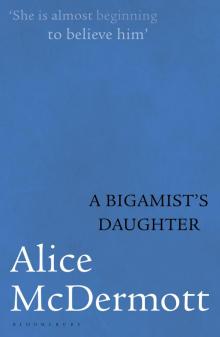 A Bigamist's Daughter
A Bigamist's Daughter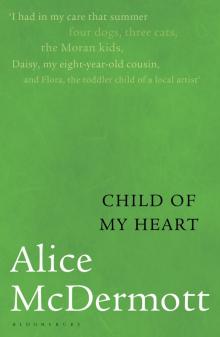 Child of My Heart
Child of My Heart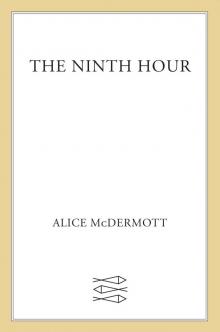 The Ninth Hour
The Ninth Hour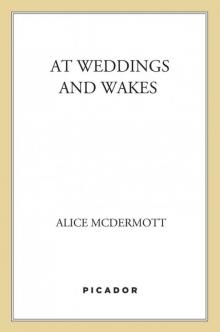 At Weddings and Wakes
At Weddings and Wakes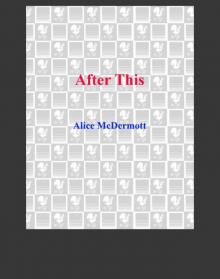 After This
After This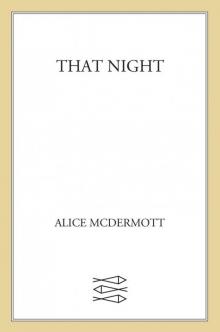 That Night
That Night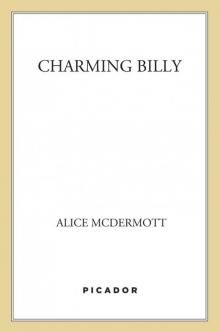 Charming Billy
Charming Billy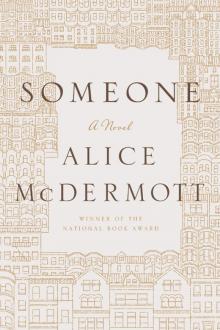 Someone
Someone